
The DWM Team regrets the deaths of Marguerite Dhoorah, killed while crossing the road in Bambous, on a pedestrian crossing, and of Dayanand Sadasing of Triolet and asks for measures to stop deaths on the roads.
Text: « Accident mortel sur un passage clouté, à Bambous, devant le poste de police » (Week-end du 22 novembre 2015), « Deux piétons fauchés mortellement »(Le Mauricien du 23 novembre 2015)
Commentary: With technologies, especially those in widespread use, like motor vehicles, accidents do happen and will continue to do so. The utmost precautions must be taken, however, to protect human life from harm by such technology.
Are we doing that with regards to road transport in this country?
A review of past accidents and events show that it is not so. Examples:
Hits and runs, 15 ton buses being driven either at 100 kph in speed zone limits, bus races, while at other times bus go-slows at 10/20 kph causing traffic blockades, disrespect of legal pedestrian crossings, yearly increase of 10 000 new vehicles for the same roads, powerful cars and motorbikes used by some for racing on public motorways, vehicles trailing others so close, totally unable to safely brake in case of sudden event, “clever” Mauritian drivers who slow down to 40 to face 60 kph speed cameras after which they rejoin the madness of over speeding , those too drunk to walk straight who get behind the wheel of their cars and drive off; etc.
We weep for the latest deaths, those of Marguerite Dhoorah, age 72, who was killed while crossing the road in Bambous, within the safety of a legal ‘crosshere’ and that of Dayanand Sadasing of Triolet. But what are the measures we are taking to stop deaths on our roads?
And the follow-up? Are we aware of the continuation of the case against the two racing drivers who were racing on a public road and who killed that innocent couple on their motorbike, just a few months ago? What has been the outcome, where has the often very slow police/judicial system reached in this case? Citizens want to know, have the right to know.
Legal measures such as strengthening the law on driving and security on the road are urgent. The Police does its best, applying existing legislation, especially with incoming festive season, but strengthening measures are still necessary. Citizen action groups are extremely useful to raise awareness and educate the public both drivers and pedestrians.
Individually, in a democratic society like ours, each citizen can become aware of dangers and contribute to road safety by doing their share. Consider these 12 common DANGERS WHILE DRIVING:
- Texting and mobile phones. It may come as no surprise that texting is one of the most common distractions to drivers. The average time that a texting driver’s eyes are focused on their phone is a mere five seconds; however, it only takes five seconds to travel the distance of a football field at 80kph. And of course the mobile!
- Hands-Free Devices
- In-Car Accessory Controls. Though an increasing number of cars feature conveniently placed accessory controls on the steering wheel, many of these controls require a driver’s focus when he or she attempts to use them, which only adds to the risk of an accident. These accessories include radios, GPS systems, cruise control functions, mirror controls, temperature settings, and just about any other in-car function that could prove to be distracting when operating the vehicle.
- Talking to other Passengers. Having a companion come along for the ride can be a highly enjoyable experience, but those with less driving experience are likely to be distracted by other passengers.
- Personal Grooming
- Eating and drinking at the wheel
- Daydreaming, i.e. lack of concentration at the wheels of a moving vehicle
- Reaching for a fallen Object
- Drink and drive
- Defective vehicles, especially worn-out tyres and defective brakes. How can we forget the bus which killed so many innocent citizens in Soreze last year and which had a history of defective brakes!
- Not respecting speed limits and not respecting the minimum braking distance between you and the vehicle in front, which is longer the faster, you are travelling.
Interrogation policière: pour une enquête, pas une sanction
Textes: Les articles de journaux, donnant l’impression que notre police a tort de libérer provisoirement M. Anil Baichoo (Certains journaux du week-end et de la semaine du 19 au 22 novembre 2015). Commentaire: […] Democracy Watch s’estime tenu de rappeler certaines vérités premières. Toute enquête policière nécessite parfois des interpellations, des interrogatoires mêmes serrés, en présence ou non d’avocats. La détention provisoire, la fameuse nuit en cellule policière ou en clinique, doit demeurer l’exception, l’ultime recours. […] A ce jeu, nos autorités, tant policières que gouvernementales, ont tout à perdre. Usent-elles de gants logiquement compréhensibles avec des suspects, ayant occupé les plus hauts postes décisionnaires, d’anciens ministres par exemple, a fortiori d’anciens vice-Premiers ministres, constitutionnels ou pas, qu’un certain public, certains journalistes, leur donnent tort. […] Tout gouvernement honnête, juste et responsable, ne saurait assez prêcher à toute force policière d’agir avec prudence et efficacité, pour le seul bien de la nation mauricienne […] afin que notre population puisse lui conserver sa totale confiance. A fortiori dans toute enquête policière provisoirement dirigée contre un ex-adversaire politique du gouvernement en place, la séparation des pouvoirs entre décisionnaires et exécutants, entre politiciens, mêmes ministres, et fonctionnaires, doit être manifeste et indiscutable. […] Au fur et à mesure que se précise le profil des différents suspects, la police doit respecter les procédures et s’entourer de toutes les précisions légales requises […]. Il y a suspect et suspect. Même en écartant les risques précités de récidivistes notoires ou de menaces pour la sécurité publique, la police est confrontée à des suspects, pouvant disparaître dans la nature ou incapables de le faire, en raison de leur trop grande notoriété. […] Un suspect parfait inconnu, devant, même en toute innocence, passer quelques jours en cellule policière, ne subit peut-être pas un préjudice plus grand que celui d’un ancien ministre, dont une certaine presse prend un plaisir malsain en annonçant plusieurs jours à l’avance qu’il sera arrêté, détenu, inculpé même provisoirement, faute de pouvoir donner à cet harcèlement le caractère d’une condamnation irréductible. […] Notre presse doit non seulement informer notre population mais encore la former, l’aider à porter des jugements sains sur les événements bons ou mauvais de notre actualité même la plus brûlante. Un appel au bon sens est de mise, au respect des droits égaux de tous devant la loi et la presse. Qu’en pense le « Media Trust »?
Notre service WhatsApp. Vous êtes témoins d`un événement d`actualité ou d`une scène insolite? Envoyez-nous vos photos ou vidéos sur le 5 259 82 00 !
















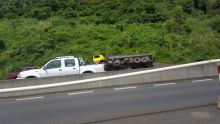
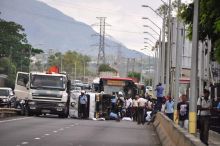
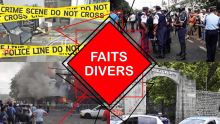


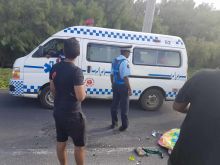
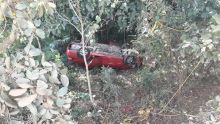







![[Info Soirée] : « bizin pa negliz bann slow learners »](https://defimedia.info/sites/default/files/styles/square_thumbnail/public/thumbnail_190425.jpg?itok=J--MzK_k)
